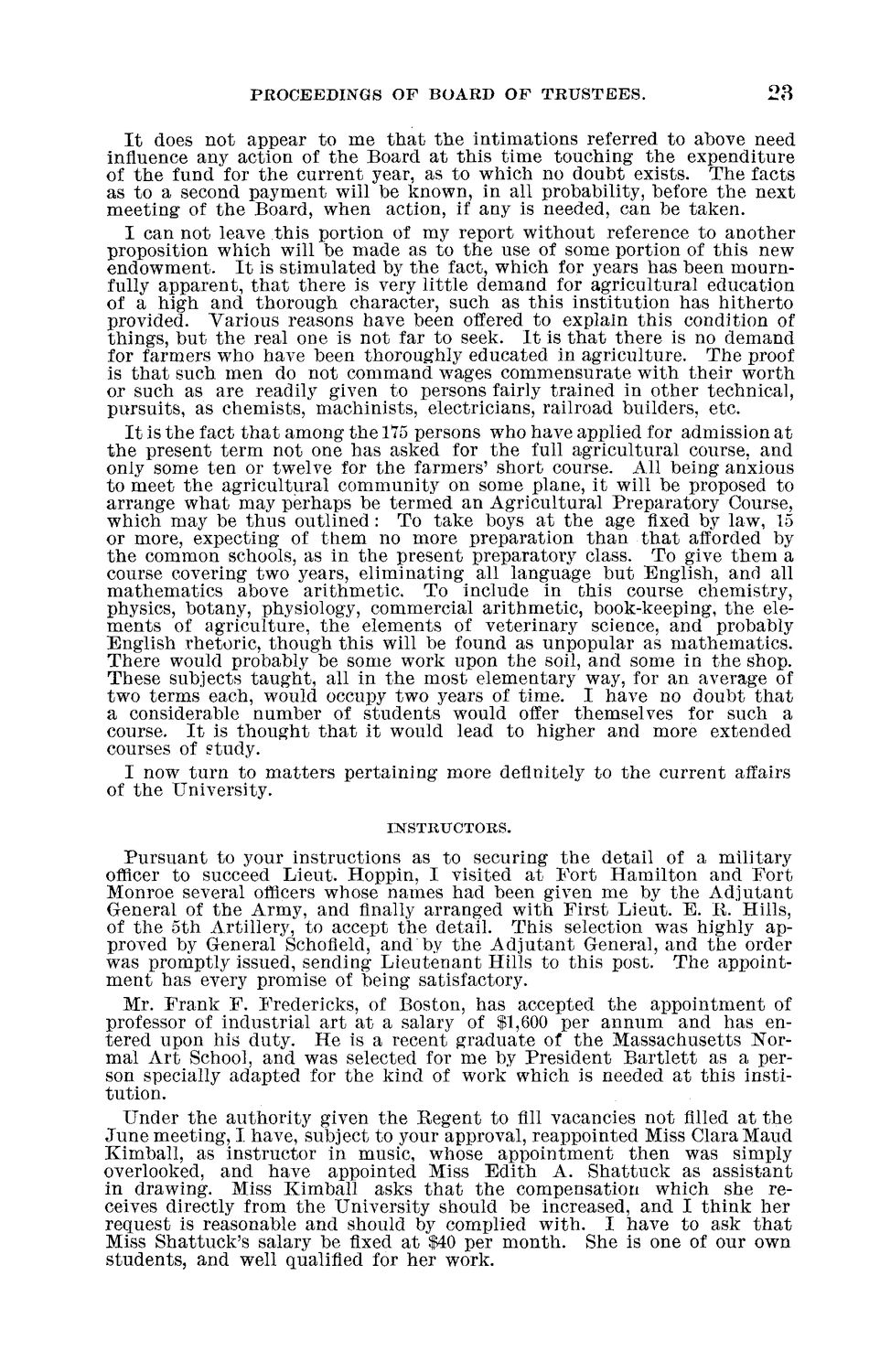| |
| |
Caption: Board of Trustees Minutes - 1892
This is a reduced-resolution page image for fast online browsing.

EXTRACTED TEXT FROM PAGE:
PROCEEDINGS OF BOARD OF TRUSTEES. 28 I t does not appear to me t h a t the intimations referred to above need influence any action of the Board at this time touching the expenditure of the fund for the current year, as to which no doubt exists. The facts as to a second payment will be known, in all probability, before the next meeting of the Board, when action, if any is needed, can be taken. I can not leave this portion of my report without reference to another proposition which will be made as to the use of some portion of this new endowment. I t is stimulated by the fact, which for years has been mournfully apparent, t h a t there is very little demand for agricultural education of a high and thorough character, such as this institution has hitherto provided. Various reasons have been offered to explain this condition of things, but the real one is not far to seek. I t is t h a t there is no demand for farmers who have been thoroughly educated in agriculture. The proof is that such men do not command wages commensurate with their worth or such as are readily given to persons fairly trained in other technical, pursuits, as chemists, machinists, electricians, railroad builders, etc. I t is the fact t h a t among the 175 persons who have applied for admission at the present term not one has asked for the full agricultural course, and only some ten or twelve for the farmers' short course. All being anxious to meet the agricultural community on some plane, it will be proposed to arrange what may perhaps be termed an Agricultural Preparatory Course, which may be thus outlined: To take boys at the age fixed by law, 15 or more, expecting of them no more preparation than t h a t afforded by the common schools, as in the present preparatory class. To give them a course covering two years, eliminating all language but English, and all mathematics above arithmetic. To include in this course chemistry, physics, botany, physiology, commercial arithmetic, book-keeping, the elements of agriculture, the elements of veterinary science, and probably English rhetoric, though this will be found as unpopular as mathematics. There would probably be some work upon the soil, and some in the shop. These subjects taught, all in the most elementary way, for an average of two terms each, would occupy two years of time. I have no doubt t h a t a considerable number of students would offer themselves for such a course. I t is thought t h a t it would lead to higher and more extended courses of study. I now turn to matters pertaining more definitely to the current affairs of the University. INSTRUCTORS. Pursuant to your instructions as to securing the detail of a military officer to succeed Lieut. Hoppin, I visited at Fort Hamilton and Fort Monroe several officers whose names had been given me by the Adjutant General of the Army, and finally arranged with First Lieut. E. B. Hills, of the 5th Artillery, to accept the detail. This selection was highly approved by General Schofield, and by the Adjutant General, and the order was promptly issued, sending Lieutenant Hills to this post. The appointment has every promise of being satisfactory. Mr. Frank F. Fredericks, of Boston, has accepted the appointment of professor of industrial art at a salary of $1,600 per annum and has entered upon his duty. He is a recent graduate of the Massachusetts Normal Art School, and was selected for me by President Bartlett as a person specially adapted for the kind of work which is needed at this institution. Under the authority given the Begent to fill vacancies not filled at the June meeting, I have, subject to your approval, reappointed Miss Clara Maud Kimball, as instructor in music, whose appointment then was simply overlooked, and have appointed Miss Edith A. Shattuck as assistant in drawing. Miss Kimball asks t h a t the compensation which she receives directly from the University should be increased, and I think her request is reasonable and should by complied with. I have to ask t h a t Miss Shattuck's salary be fixed at $40 per month. She is one of our own students, and well qualified for her work.
| |